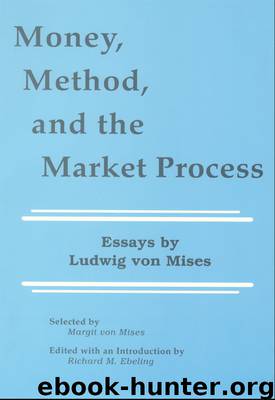Money, Method, and the Market Process by Ludwig von Mises

Author:Ludwig von Mises [Ludwig von Mises]
Language: eng
Format: epub
ISBN: 978-0-94546-606-2
Publisher: Ludwig von Mises Institute and Kluwer Academic Publishers
Published: 1990-03-24T16:00:00+00:00
VIII
Totalitarianism and Autarky
Ferdinand Lassalle, the founder of the German Social Democrat Party and the eloquent champion of government control of business, is credited with the dictum: “The State is God.” Eminent scholars, for instance Ambassador Carlton Hayes, call nationalism a new religion, the creed of our day.
People distinguish between the parties of the Left and the parties of the Right. The former, they say, are the “progressives,” the supporters of government control of business, the socialists and the communists; the latter the “reactionaires,” the nationalists. This classification is spurious. The socio-economic tenets of both groups differ only in minor points. They both aim at full government control of business. It is difficult to decide to which of these two totalitarian groups the most eminent intellectual harbingers of present-day “unorthodoxy” are to be assigned. There is no doubt that Lassalle was also the forerunner of German National Socialism and the first German who aimed at the Führer position. The Frenchman Georges Sorel, the advocate of the “action directe,” i.e., violent trade union activities and general strike, was the preceptor both of Lenin and Mussolini. The socio-economic program of Italian Fascism, the stato corporativo, is an exact replica of the schemes of British Guild Socialism; its most lucid exposition is the book of the English Fabians and enthusiastic pro-Soviet writers, Sidney and Beatrice Webb: A Constitution for a Socialist Commonwealth of Great Britain (1920). Not only Mussolini, but many outstanding French collaborationists and German Nazis (for instance, Werner Sombart) were Marxian readers before they turned to the “Right.”
The truth is that modern nationalism is a corollary of the domestic policy of government control of business. It has been demonstrated that government control of business would manifestly fail already in the short run if the country is not isolated from the rest of the world. A government aiming at full regimentation of business must aim at autarky too. Every kind of international economic relations impairs its power to interfere with domestic business and limits the exercise of its sovereignty. The state cannot pretend to be an omnipotent god if it has to bother about its citizens’ ability to compete with foreign business. The outcome of government interference with business is totalitarianism, and totalitarianism requires economic self-sufficiency.
The same is valid with regard to self-proclaimed socialist states, that is states which have openly nationalized all economic enterprises and boast of this achievement. Socialism, when not operated on a world scale, is imperfect, if the socialist country depends on imports from abroad and therefore still has to produce commodities for sale on a market. It does not matter whether these foreign countries to which it has to sell and from which it has to buy are socialist or not. Socialism must always aim at autarky.
Protectionism and autarky mean discrimination against foreign labor and capital. They not only lower the productivity of human effort and thereby the standard of living for all nations; they create moreover international conflict.
There are nations which for lack of adequate resources cannot feed and clothe their population out of domestic resources.
Download
This site does not store any files on its server. We only index and link to content provided by other sites. Please contact the content providers to delete copyright contents if any and email us, we'll remove relevant links or contents immediately.
The Art of Coaching by Elena Aguilar(50014)
Thinking, Fast and Slow by Kahneman Daniel(10585)
The Art of Thinking Clearly by Rolf Dobelli(8841)
The 5 Love Languages: The Secret to Love That Lasts by Gary Chapman(8494)
Mindhunter: Inside the FBI's Elite Serial Crime Unit by John E. Douglas & Mark Olshaker(7834)
Therapeutic Modalities for Musculoskeletal Injuries, 4E by Craig R. Denegar & Ethan Saliba & Susan Saliba(7349)
Periodization Training for Sports by Tudor Bompa(7328)
When Breath Becomes Air by Paul Kalanithi(7263)
Bodyweight Strength Training by Jay Cardiello(7185)
Becoming Supernatural by Dr. Joe Dispenza(7105)
Turbulence by E. J. Noyes(7039)
The Road Less Traveled by M. Scott Peck(6634)
Nudge - Improving Decisions about Health, Wealth, and Happiness by Thaler Sunstein(6633)
Enlightenment Now: The Case for Reason, Science, Humanism, and Progress by Steven Pinker(6405)
Win Bigly by Scott Adams(6311)
Mastermind: How to Think Like Sherlock Holmes by Maria Konnikova(6235)
Kaplan MCAT General Chemistry Review by Kaplan(6053)
The Way of Zen by Alan W. Watts(5799)
Why We Sleep: Unlocking the Power of Sleep and Dreams by Matthew Walker(5641)
